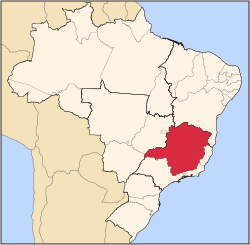PMMG
|
Minas Gerais Military Police Polícia Militar de Minas Gerais - PMMG |
|
|---|---|
| Abbreviation | PMMG |

Badge of the Minas Gerais Military Police
|
|
| Motto | "Our duty, your life" Nossa profissão, sua vida |
| Agency overview | |
| Formed | June 09, 1775 |
| Legal personality | Governmental: Government agency |
| Jurisdictional structure | |
| Operations jurisdiction* | State of Minas Gerais, Brazil |
 |
|
| Map of Minas Gerais Military Police's jurisdiction. | |
| General nature | |
| Operational structure | |
| Headquarters | Belo Horizonte |
| Website | |
| Polícia Militar de Minas Gerais | |
| Footnotes | |
| * Divisional agency: Division of the country, over which the agency has usual operational jurisdiction. | |
The Polícia Militar de Minas Gerais (PMMG) (Minas Gerais Military Police) is a military law-enforcement organization in the state of Minas Gerais, Brazil. It is both the oldest and the second largest state police force in all of Brazil, with approximately 48,000 officers under its command. As a gendarmerie, its duties largely consist of preventing crime and patrolling both the towns and countryside of Minas Gerais.
Originally formed in 1775 entirely from local volunteers, the force would eventually integrate military discipline and training while also adjusting its methods and organization to match changes in Brazilian law. A storied unit, the PMMG has counted several notable Brazilians in its ranks over the years.
The PMMG's primary mission is to deter and control crime throughout the state, often by patrolling streets or public facilities in cities, such as schools. However, it is also responsible for monitoring the open lands, forests, rivers, and highways of Minas Gerais, and will even carry out reconnaissance missions, referred to as P2.
The force is divided evenly between Belo Horizonte, the capital of Minas Gerais, and the remaining cities and districts. The PMMG's administrative structure consists of 15 regions, subdivided into large battalions down to individual detachments, which always consist of a minimum of 4 officers to a county.
Towards the end of the seventeenth century, gold was discovered in Minas Gerais, and as miners began finding other ores and gems, waves of migrants from all over Brazil began a gold rush to the state. Within the chaotic mass of newcomers, violence and disorder became prevalent enough to worry colonial Portuguese authorities. At least as concerned about collecting taxes on the newfound mineral wealth as stopping the lawlessness, Governor Pedro Miguel de Almeida requested two companies of Portuguese dragoons from the King of Portugal.
However, discipline rapidly broke down among the Portuguese soldiers, and many deserted to become prospectors themselves. The people of Minas Gerais wanted a capable and loyal force to maintain order and punish wrongdoers, but not a heavy-handed unit focused on imposing Portuguese regulations. As a result, on June 9, 1775 the governor, Don Antonio de Noronha, would officially disband the Portuguese dragoons and replace them with the Regular Cavalry Regiment of Mines.
...
Wikipedia
